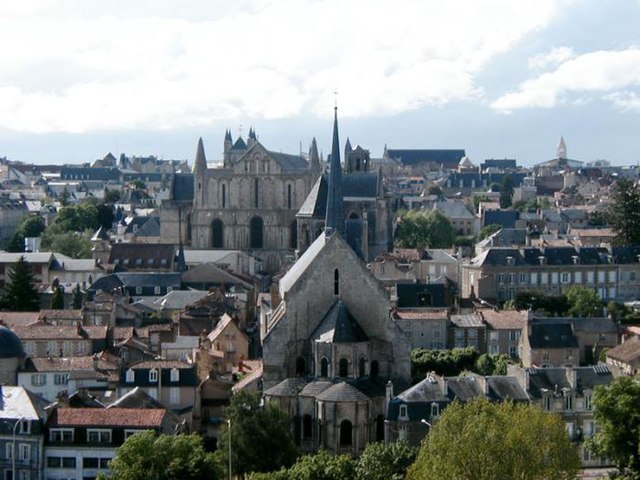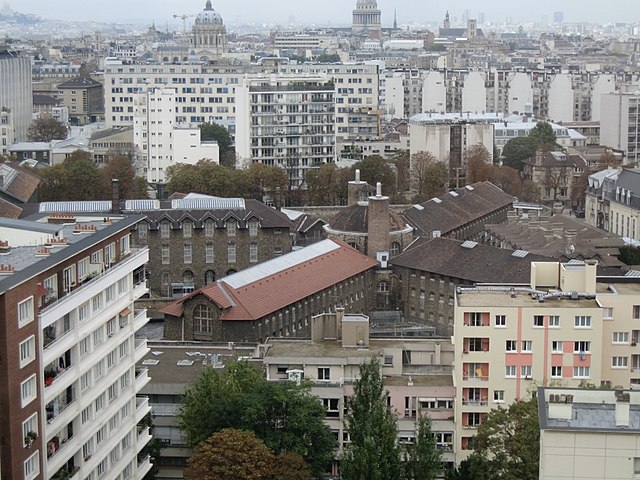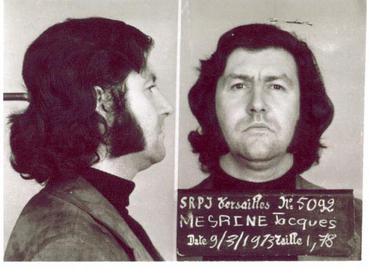Paris, 1979. It’s 3:10pm on the 2nd of November, the Day of the Dead.
A 43-year old man climbs into a BMW, parked outside his flat in Porte de Clignancourt. On the passenger seat, his beautiful girlfriend Sylvia is smiling — they are about to leave Paris behind for a relaxing holiday in Normandy. Their little dog, ‘Scoundrel’, is excited to join them for the trip.
As the man wears his safety belt, he positions two pieces of hand luggage by his feet.
Carefully, very carefully.
They are two hand grenades, with the safety pin partially removed.
It’s 3:14pm.
Somewhere else in Paris, police radios crackle, and an order is relayed. The target has been identified, and it’s time to intervene.
The man in the BMW is Jacques Mesrine: robber, kidnapper, murderer, serial evader, and Public Enemy Nr 1. He is wanted by the police forces of France, Canada, Spain, and Switzerland.
That man is also Jacques Mesrine: self-appointed rebel, a one-man army against the corruption of the bourgeois state. A modern-day Robin Hood who only steals from the real thieves: banks, corporations, and casinos. An activist who has been campaigning against the harshness of high-security prisons.
Whatever the truth about that man, one thing seems certain. This will probably be the last minute of his life.
Young Jacky
Jacques-René Mesrine was born on December 28, 1936, second child to Pierre and Monique, who were small-time entrepreneurs in the textile sector.
The early years of Jacques – or ‘Jacky’ as his father called him – are happy and uneventful, until that Spring of 1940, in which he, his family, his country suffer the trauma of the German invasion. Pierre was captured and sent to a PoW camp in Germany. Meanwhile, Monique and the children had to evacuate their house in Clichy, suburban Paris, to relocate to the countryside.
Jacky spent the occupation years at a farm near Poitiers, owned by relatives. He soon found out that this farmer was part of the Resistance, and Jacky was allowed to attend the partisans’ secret meetings at night. By day, he played soldier with his friends. It was in this environment that he developed a taste for guns.

After D-Day, he witnessed resistance fighters ambushing a retreating German column, not far from the farm. The following day, Jacky and his sister found a bloody, mangled corpse by the road. This was his first direct encounter with death, which did not shock him at all.
Some days later he would experience another ‘first’.
The partisans had rounded up some women accused of collaborating with the Germans, or sometimes just accused of being sexually or romantically involved with them. Their hair was shorn, their faces beaten.
Jacky stared at one of them. A fighter had painted a swastika on her forehead. This woman became the target of the partisans’ wrath: they hit her with the butt of their rifles, and eventually killed her. In the process, her dress was ripped open.
Mesrine later recalled this as his first experience with female nudity, definitely more traumatic than the corpse he had seen days earlier.
After the war was over, Jacky returned to Paris, happy to be re-joined by his father soon afterward.
Some sense of normalcy had returned, but Jacky could not adapt to the daily routine of going to school after years of freedom at the farmhouse. He played truant most of the time, ignored homework, and became the boss of a gang of street urchins.
By his teenage years, Jacky had been expelled from two high-schools, on one occasion for punching the headmaster.
By the age of 15, Jacky’s dad had wisely decided to get him an apprenticeship, as studying was not his strong suit. Jacky worked for a couple of years at a fashion designer’s workshop, even doing some errands for celebrities like Audrey Hepburn and Zsa Zsa Gabor.
At the same time, Jacky was staging his first burglaries with a friend. His favourite technique was to enter middle-class flats disguised as flower delivery boys.
During this period, Jacky lost his virginity to an older woman, a prostitute named Sarah. In his memoirs, he admitted that upon seeing her undressed, he thought about the collaborationist woman that had been killed by the partisans.
For two years, Jacky was smitten with Sarah, even trying to get her out of prostitution, but he eventually desisted. At the age of 18, he was too distracted: first, by his criminal career, and then, by a young student from Martinique named Lydia de Souza.
The two had met at a party at the Cité Universitaire in Paris. The sexual attraction had been strong and immediate.
So, in 1955, at the age of 19, Jacky and Lydia got married. The wedding had been accelerated by the fact that Lydia was pregnant … but not with Jacky’s child. Nonetheless, the young burglar acknowledged the child as his own.
Probably not a great start to a relationship! In fact, their marriage was an unhappy one. Lydia had frequent affairs, which got her the title of ‘Saint Slut’ in Mesrine’s memoirs.
Jacky was unhappy. He took to the bottle and became physically abusive. He jumped at the occasion to leave it all behind when the French Army conscripted him in 1956. The following year, the couple divorced, and Jacky volunteered to serve in Algeria, training as a paratrooper and commando.
Finally, his love of adventure, his passion for guns, his simmering desire for violence would all be satisfied.
At the time, the French military was waging a bitter, ‘dirty’ war against the Algerian National Liberation Front, struggling for independence.
Jacky, the boy, was no more.
He was Jacques the soldier now.
He volunteered for special anti-guerrilla actions and duties, which included some pretty dangerous combat missions. He also assisted the military police in torturing members of the Liberation Front. Or even worse, executing them with a bullet to the head.
In his memoirs, he admitted to holding a blind hatred toward Algerian fighters. Though on one occasion, he defied his Sergeant’s orders by releasing three Algerian prisoners. One of them, aged only eight, reminded him of his younger self in Nazi-occupied France.
Throughout the Algerian period, Jacques lied to his parents, telling them that he had been stationed in an office, away from combat.
When he was demobbed in April 1959, his father was surprised to see a Military Cross for bravery pinned on his chest. Pierre Mesrine was dead proud of his son… but he also knew that conflict was changing him. He later admitted that Jacques was never the same after returning from Algeria. Something had cracked inside him, and a new persona had emerged.
Something dangerous.
Jacques the Burglar
After Algeria, the return to civilian life bored Jacques to death. He craved adrenaline, whatever the source.
Initially, Mesrine gravitated towards political violence and terrorism. By day, he worked as a textile salesman. By night, he frequented members of the OAS – Organisation of the Secret Army. This group violently opposed President De Gaulle’s policy to grant independence to Algeria.
But Jacques’ preference was for ‘ordinary crime’. He spent his nights committing small burglaries and playing poker. In this period, he partnered with an accomplice known as ‘Guido the Sicilian,’ one who would mentor him toward more serious crimes.
In 1959 he committed his first serious burglary, in the flat of a wealthy businessman. As he was boring his way into a safe, his drill broke down. Jacques left, broke into a hardware store, stole another drill, and went back to finish the job.
During the same period, he committed his first cold-blooded murder. On a night out with Guido, Jacques had run into Sarah, his old flame. There was a violent altercation with Sarah’s new boyfriend and pimp, an Arab man named Ahmed. Jacques ended the fight by pistol-whipping Ahmed.
The morning after, Ahmed beat up Sarah, trying to extract Jacques’ address from her. When Jacques and Guido found out, they kidnapped Ahmed and led him into the woods outside Paris. They stripped him naked and then Jacques slowly stabbed him to death with his ‘Algerian souvenir’: a 15-centimetre dagger.
Jacques was starting to build a reputation, both in the underworld and among the police.
In the summer of 1960, after yet another burglary, Jacques and two accomplices went to Spain to lay low. There, they settled in Tossa del Mar, on the Costa Brava. One night, Jacques ‘hooked up’ with a local girl, Maria Soledad.
The two were an unlikely match. Jacques was brash, adventurous, a ladies’ man.
Soledad was shy, still under tight supervision from her parents, and a virgin.
Well, at least until she had met Jacques.
After the summer holidays, Jacques and friends returned to their old habits in Paris. But this life was about to be abruptly interrupted, when an unexpected visitor knocked at Jacques’s door: it was Soledad.
She had gotten pregnant during their affair. Defying her parents, she had left home to move in with Jacques in Paris.
The two married on the November 4, 1961 and went on to have three children: Sabrina, Boris, and Bruno. Fatherhood did not deter Mesrine from crime: In January of 1962, he was arrested on counts of burglary and carrying a concealed firearm, receiving an 18-month sentence.
After serving his time, Jacques made a serious attempt to lead an honest life.
He first joined an interior design firm as an apprentice, working hard and showing a real knack for architecture. It was a pity then, that the firm made him redundant after less than a year!
Next, Soledad’s family tried to help by offering him a management position with a hotel in the North of France. But the establishment soon became a meeting spot for local criminals … and Monsieur Mesrine went back to his old habits.
Around this period, he made an important discovery: it took very little to alter his likeness. A pair of glasses, a hat, a wig, a beard … just a single detail could make him unrecognizable.
Mesrine would exploit this talent for future criminal endeavors.
Meanwhile, Soledad patiently waited at home, unaware that her husband had developed a relationship with another woman, a prostitute called Jeanne Schneider, known as ‘Janou’.
In time, Janou became more than a lover to Mesrine: she was a second wife to him and an invaluable accomplice. He introduced her to his old mentor Guido and even to his father. Both gave their blessing to the relationship.
One night, Janou was hanging out at Mesrine’s hotel, when the bar was raided by a gang of thugs. Mesrine confronted the leader, knocking him out with a truncheon. Janou, without missing a beat, unholstered a .38 handgun and kept the rest of the gang at bay.
These were two criminal souls, made for each other.
Jacques et Janou, comme Bonnie et Clyde
The next appointment in Mesrine’s criminal resumé is the most puzzling one.
On December 2, 1965 he was arrested in Palma de Mallorca, Spain, as he was trying to steal confidential documents from the office of the military governor. In his memoirs, Mesrine claims that this was a job somebody had commissioned to Guido ‘the Sicilian’ and him … but who? This is not clear.
The ‘Le Monde’ newspaper speculates that this job may have been linked to Mesrine’s old days with the OAS – the anti-De Gaulle terrorists. In the mid-60s, many former OAS members were hiding in Spain, with protection form Francisco Franco’s military.
The Palma heist may have even been ordered by the DRM – French Military Intelligence – to retrieve a list of OAS subversives in exile.
Mesrine the gangster as a government agent? An interesting theory, supported by what happened next: after his arrest, Mesrine was transferred to the French Embassy in Madrid, repatriated, and given a very lenient sentence.
In October of 1966, Mesrine gave it another go at honesty and opened a restaurant in the Canary Islands. Soledad was with him, to recover their relationship.
The project failed miserably, and the couple eventually divorced.
In 1967, Jacques and Janou became a permanent item, in life and in crime. In November, they first attracted the attention of the special squads of the French judiciary police. The two raided a luxury hotel in Chamonix, in the Alps, and briefly held a Tunisian businessman at ransom. After extorting a large sum, the two lived on the run for three months.
With the police on their backs, Mesrine and Janou decided to leave the country for good. On the February 6, 1968, they took off from Orly airport. Destination: Québec. From February to June of 1968, the couple were employed, as chauffeur and housekeeper, by a Montreal millionaire, Georges Deslauriers. But after rows with other staff, they were sacked.
No job? No problem!
Mesrine and Janou kidnapped the millionaire, asking for a $200,000 ransom. After cashing in the loot, the couple laid low for several months in the town of Percé, as guests of a widow whom they had befriended.
The couple tried to escape to the US, but were caught in Arkansas and extradited to Canada on July 16, 1969.
Jacques and Janou were both incarcerated at the Percé jail. They were charged with kidnapping the Montreal millionaire, but also with murdering their friend, the widow. Her body had been found on June 30, strangled.
They were eventually acquitted of the murder, but the outrage at this charge prompted Mesrine to stage his first in a series of jailbreaks.
On August 17, he managed to capture a prison warder. After stealing his uniform and keys, Jacques then proceeded to free his lover.
Unfortunately for them, they were caught the very next day, and Mesrine was sent to a high-security prison, St Vincent de Paul, in Laval, west of Ottawa. Mesrine now took his time to plan the next escape. Over the next three years, he recruited a team of five accomplices, and he created a secret stash of tools from the prison workshop.
Finally, on August 21, 1972, Mesrine led his fellow inmates in a daring escape, cutting through several fences with the tools he had stolen. Once outside the perimeter, the six escapees simply flagged down some cars and hitched a ride to freedom.
Mesrine had now partnered with one of the escaped convicts, a violent gangster called Jean-Paul Mercier.
Over the ensuing ten days, the two attacked three banks, robbing them a total of four times!
On the 26th of August, they held up two small-town banks, 10 minutes apart from each other.
On the 28th they raided a bank in Montreal. As Mesrine did not like the defiant look from one of the cashiers, they returned three days later for a second heist!
With their pockets full of cash and weapons, Mesrine and Mercier went one step further — on the 3rd of September, they attacked their old prison, Saint Vincent, to free some old friends still inside.
As they started the assault, they were caught between a rock and a hard place: warders were shooting from the prison walls, and two police cars arrived as reinforcements. Jacques and Jean-Paul unleashed an ‘inferno of gun fire.’
Mesrine successfully hit the police car, severely wounding the two officers inside. Mercier kept the prison staff at bay, until a bullet caught him in the leg.
Outnumbered and almost out of ammo, the two jumped back in their car and sped off.
Hounded by every police officer in Québec, the duo sought refuge in the woods. For a week they were undisturbed, until they killed two forest guards, who had mistaken them for poachers.
And what of Janou in the interim? Well, she was still in jail, and Mesrine had made plans to spring her. But when Jacques informed her of his plan, she asked him not to follow through on it. Janou suspected that the police would lay a trap at her prison and she didn’t want him to get caught.
Thus, Janou sacrificed her last chance to see Mesrine. The two would never meet again.
Mesrine and Mercier continued with their robbing spree throughout October, November, and December of 1972. The two, especially Jacques, had become national celebrities in Canada, even if it came with a dark reputation for murder and violent heists. Along the way, Mesrine even picked up a ‘groupie’ of sorts, Joyce Derache.
This new lover followed him everywhere. When he eventually decided to flee from Canada return to France, she followed him … hidden in his luggage!
Time at La Santé
So, in early 1973, Mesrine was back in France and up to his old tricks. On March 5, he wounded a police officer after a violent quarrel with a cashier at a bar — a mistake that would cost him his freedom.
He was arrested on the 8th and scheduled to appear before a judge months later, on June 6, at the courthouse in Compiegne, northwest of Paris. As his charges were being read, Mesrine produced a gun, stuffed in his belt. He had retrieved it from the toilets, where an accomplice had left it for him.
This was Mesrine at his most brazen. He held the judge at gunpoint, and using him as a human shield, walked free out of the tribunal.
That’s the moment when Mesrine the gangster became a celebrity, a household name. It’s also when authorities declared him Public Enemy Nr 1. The Ministry of the Interior created a special squad headed by commissaire – or chief inspector – Robert Broussard.

Jacques had found his nemesis.
Broussard and his colleagues had a great opportunity to catch Mesrine in September of 1973. On the 28th, the gangster performed his signature move, a double-armed robbery of two adjacent banks. Mesrine and his gang made their getaway, pockets loaded with cash. But it was a close call: the police arrived in force and managed to arrest one of the gang’s drivers.
The squad pressured the driver until they had an address. The day after, Broussard’s squad surrounded Mesrine’s flat and forced him to surrender.
Jacques Mesrine was again behind bars, and they weren’t keeping him at just any old jail. He was sentenced to spend a term of 20 years inside the high-security wing of La Santé Prison. This was a harsh institution, placed in the heart of Paris and plagued by overcrowding, sexual violence, and unsanitary conditions.
During the following five years at La Sante, Mesrine created a new public persona for himself.
Jacques the gangster became Jacques the gentleman robber, who only struck at the rich and powerful but never harmed the little guy in the street. He became Jacques the activist, who criticised the corruption of the Government and the inhumane conditions of the QHS,
the High-Security Wings in which convicts rotted in solitary confinement. As such, Mesrine became a darling of the media and the ultra-left.
Mesrine also took the time to write his autobiography, Instinct of Death. In the book, he re-emphasized how many of his actions were ideologically motivated, although he admitted that his pursuit of a life of crime was tied to his love of risk and adrenaline.
This is why he defined himself as a ‘kamikaze of crime’.
He also claimed to have killed 39 people, which was probably an exaggeration, but he did offer very precise details on some of these murders.
Instinct of Death, of course, was published prior to one of the most spectacular chapters of Mesrine’s life: his escape from La Santé.
The Great Escape
Mesrine’s time in the QHS was not as harsh as he depicted. He could count on the friendship of many convicts, and even warders, who would smuggle cigars and other luxury goods for him.
One of these warders offered to help Mesrine escape from La Santé. The man took several duplicates of the keys to the prison cells and smuggled them to Mesrine, alongside two handguns, tear gas canisters, pincers, a mountaineering rope, and a grappling hook.
Mesrine and his accomplice stashed the items inside the ventilation system of the consultation rooms, designated for lawyers to meet their convict clients. To protect them from humidity, they wrapped each object with socks and rubber gloves.
It’s the 8th of May, 1978.
Mesrine is taken by guards into a consultation room to meet his lawyer. As soon as they are alone, he orders her to stay silent, and then retrieves his tools from the aeration vent.
Guns in hand, Mesrine quickly holds up some of the guards; one of them is the deputy-chief warder. Mesrine strips him naked and wears his uniform. Now, the gangster locks them all up inside the consultation room, then proceeds to free two more convicts, François Besse and Carmen Rives.
The trio lower themselves into a courtyard with the climbing rope. They are expecting to see only fellow inmates, but they stumble upon a group of guards and building contractors.
Mesrine holds them at gunpoint, and the trio moves on to clear the next obstacle: the perimetral wall.
On the walkway atop the wall, a guard is keeping watch with a rifle.
Mesrine incapacitates him with tear gas and then grabs his gun. All the warders are on alert now and they are firing against them!
Mesrine exchanges gunfire with the guards, as Besse lowers himself onto the street outside the prison. The bandit then hands over the rifle to Rives. It’s his time to climb down to freedom, too.
Rives is next, but he loses his grip on the climbing rope and crashes onto some scaffolding, 7 metres below. A bad fall. But he is still alive!
Now, police reinforcements have arrived. As Rives tries to stand up, an officer shoots him, killing him instantly.
Mesrine is ready to fire back, but his gun jams. This ultimately aids his escape. The police, seeing his uniform, are confused and hesitate to shoot back. Seizing the moment, Mesrine and Besse stop a passing car, shove the driver out of the way and speed off.
This was the first-ever successful escape from La Santé. Mesrine was dangerously close to becoming a legend.
Life on the Lam
After such a feat, any gangster would lie low and stay quiet for a while, but Mesrine was not just any gangster.
On July 27, 1979, popular magazine ‘Paris Match’ published a sensational interview with Mesrine, recorded some time after his escape.
In the interview, Mesrine acknowledged his respect for Chief Inspector Broussard, issuing the warning that he would not be caught alive the next time. Surprisingly, the gangster also admitted to further crimes, giving very precise details.
For example, on May 26, 1978, Mesrine and an accomplice had stolen 13 Million Francs from the casino at Deauville in Normandy.
As he put it, “Attacking a casino is to attack the empire of vice. The only way to beat the house, is to go with a gun”
Mesrine and friend had barely made it alive, after being chased and shot at by police on foot, in car, and from a helicopter. After spending some days in the woods of Normandy, Mesrine baffled the police once again, and prepared the next heist, against a branch of Bank Société Générale.
This was not a random choice. The general director of this bank had sued Mesrine for slander following the publication of his book, Instinct of Death.
When Mesrine was forced to pay damages, he wrote to the director, “You are taking all my money, that’s OK, but consider this to be a loan.”
On January 3, 1979, another interview emerged, this time published by Libération.
Here, he gave details of his attempted kidnapping of Charles Petit, in November of ’78. This was the judge who had sent him to La Santé. Mesrine raided the judge’s flat, but Petit was not there! Enraged, Mesrine sprayed the judge’s family with tear gas and left the flat. The apartment block had been surrounded by police, but the gangster escaped by taking another officer hostage.
Mesrine’s relationship with the press was not always so cordial. In September of 1979, ex-policeman and journalist Jacques Tillier accused Mesrine of being a dishonourable crook, who betrayed his accomplices.
Mesrine was livid.
He invited Tillier to a remote cave for an exclusive interview, and the journalist fell into the trap. Mesrine tortured him and shot him three times.
He shot him in the face, “to stop him talking crap”.
He shot him in the arm, “to stop him writing crap”.
And he shot him in the leg – just for the pleasure of it.
Tillier, luckily, survived.
Day of the Dead
All the criminal activity, the interviews, the confirmations, and the successful escapes were an embarrassment for the police and the government. Inspector Broussard, alongside his new deputy Mireille Balestrazzi, were often close to finding Mesrine, but always one step behind.
Then, at the end of October 1979, Broussard and Balestrazzi received a tip-off: Mesrine was living with his new girlfriend, bar maid Sylvia Jeanjacquot, in the Porte de Clignancourt area.
The detectives assembled a team of 50 officers and 15 vehicles and prepared a plan of action. They would take Mesrine by surprise inside his car, by blocking him at the front and rear with two trucks.
Broussard got authorisation from his supervising magistrate to act in a state of ‘permanent self-defence’. This allowed maximum force reaction, due to the danger posed by Mesrine.
It’s November 2, 1979. The Day of the Dead.
At 3:15pm, Mesrine pulls out from his parking spot, but a truck with a blue tarpaulin blocks his way. Then the tarpaulin flies open, and three men armed with assault rifles jump out.
Mesrine immediately ducks, probably reaching for the hand grenades. But the seat belt blocks his movements. Instinctively, the three men open fire, piercing the windshield with 21 rounds.
Sylvia is severely injured and will lose an eye.
Jacques Mesrine, Public Enemy Nr 1, dies on the spot. As he predicted, he would not be caught alive.
The police operation and its aftermath remain controversial. Broussard and his men were seen drinking champagne by the corpse, and hours later even offered a glass to Mesrine’s daughter! This controversy fuelled the rhetoric of those who saw Mesrine as a sort of folk hero. Should he be remembered as such?
I will only quote his spiritual testament, which he recorded for Sylvia to listen after his death:
“What is terrible is that some will try to make a hero out of me. But after all, there are no heroes in crime. There are only men who are marginalised, who do not accept laws. Because laws are made by the rich and the powerful.”

Sources:
https://www.academia.edu/4295484/Jacques_Mesrine_Linstinct_de_mort
https://www.independent.co.uk/news/world/europe/jacques-mesrine-le-grand-gangster-1766392.html
http://grands.criminels.free.fr/mesrine.html
https://www.lemonde.fr/blog/moreas/2007/01/29/mesrine-ou-lart-du-nanar/
https://books.google.com/books/about/Jacques_Mesrine_L_Histoire_Vraie_de_l_En.html?id=gin_AwAAQBAJ
https://books.google.com/books/about/The_Mesrine_Conclusion_Revised_and_Updat.html?id=88_AAgAAQBAJ
https://www.scribd.com/read/238625946/100-Most-Infamous-Criminals
https://www.scribd.com/read/238628864/Criminal-Masterminds
Interviews
https://www.liberation.fr/societe/2011/01/15/la-societe-assassine-des-detenus_707408
Death
https://paris-luttes.info/le-2-novembre-1979-mesrine-est-004
https://www.lemonde.fr/blog/moreas/2006/11/13/fallait-il-tuer-jacques-mersrine/
Mesrine and the QHS
https://base.centre-simone-de-beauvoir.com/DIAZ-510-27-0-0.html



